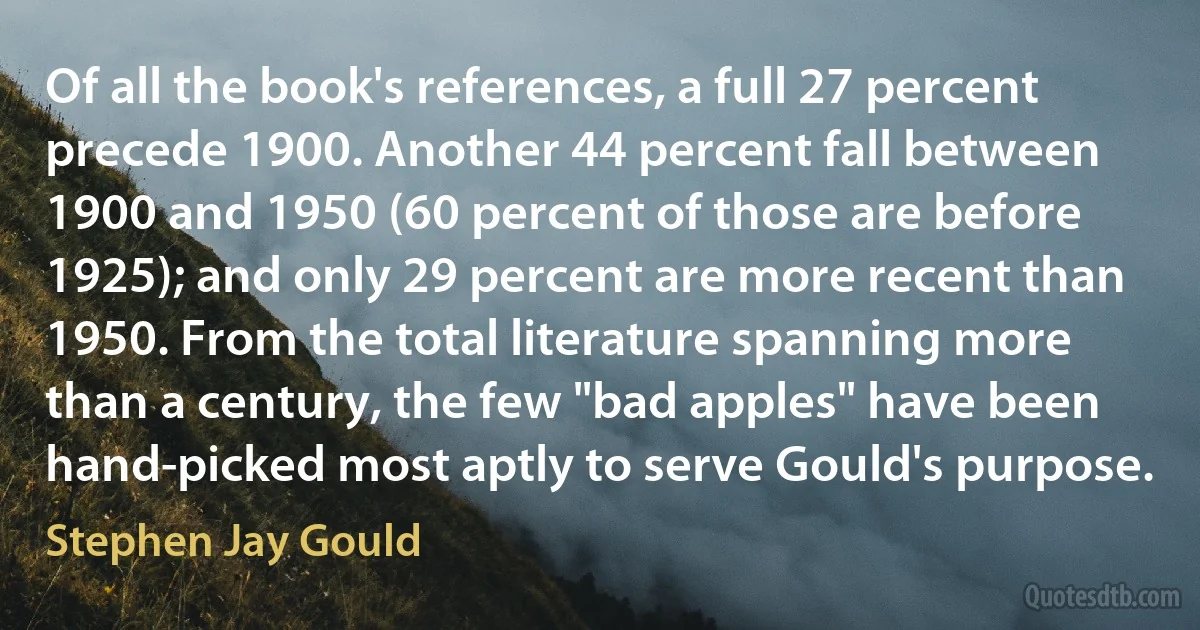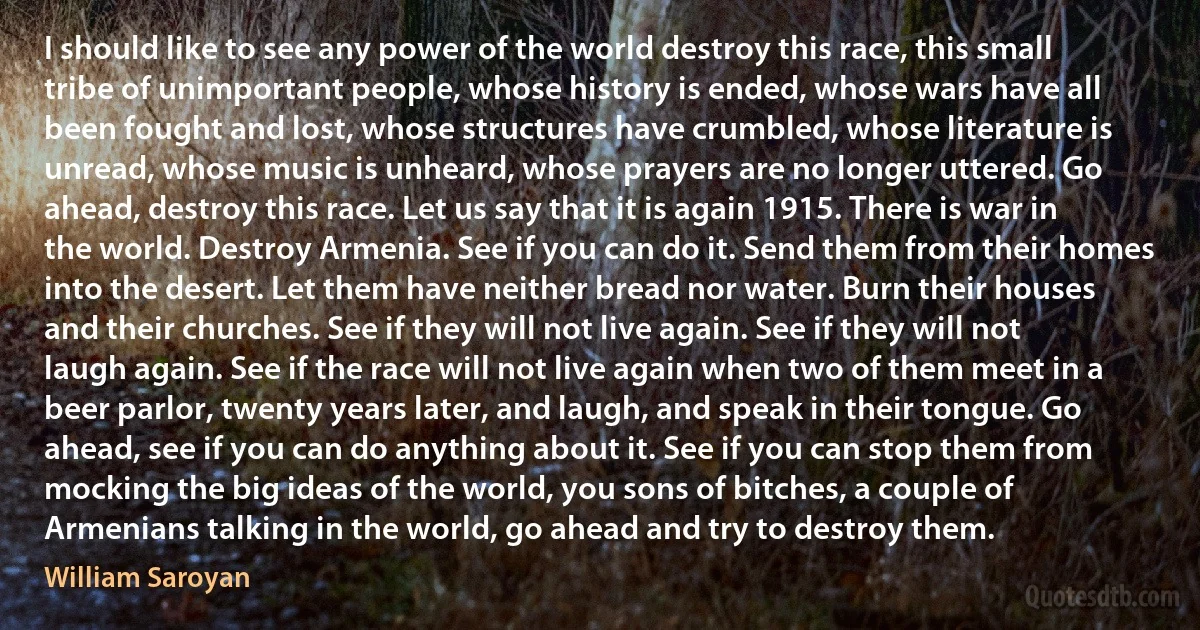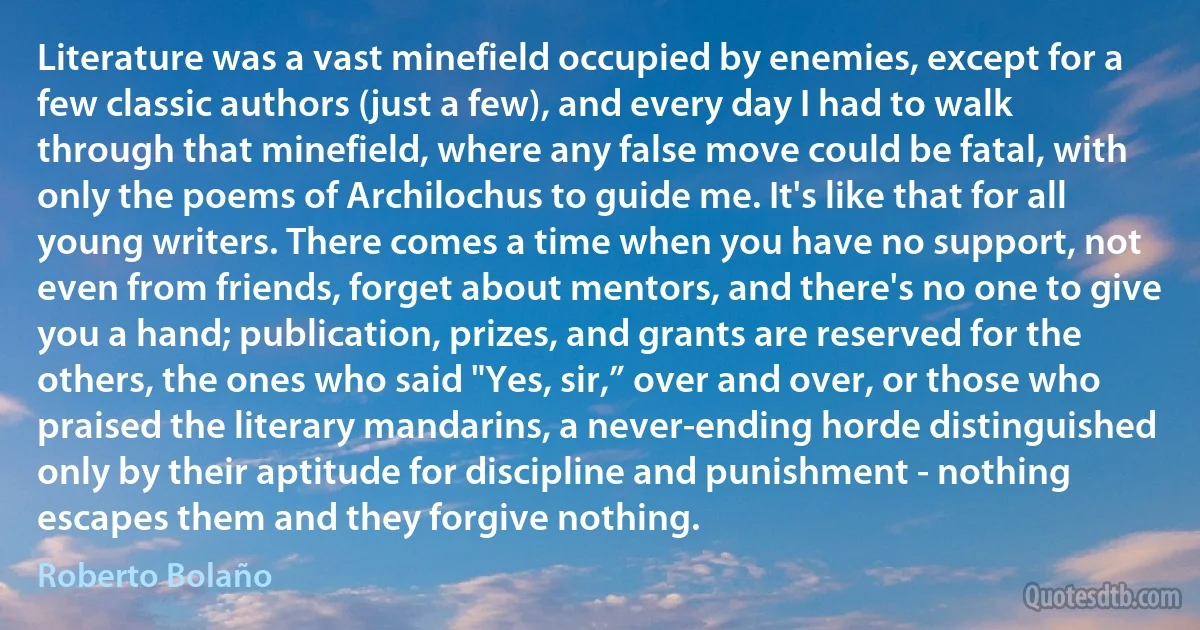Literature Quotes - page 72
A real book reads us. I have been read by Eliot's poems and by Ulysses and by Remembrance of Things Past and by The Castle for a good many years now, since early youth. Some of these books at first rejected me; I bored them. But as I grew older and they knew me better, they came to have more sympathy with me and to understand my hidden meanings. Their nature is such that our relationship has been very intimate. No literature has ever been so shockingly personal as that of our time - it asks every question that is forbidden by polite society.

Lionel Trilling
You can form no idea of the beauty that is possible! You cannot imagine what all the squandered treasure can provide, what can be brought on by the resurrection of misguided human intelligence, successively smothered and slain hitherto by infamous slavery, by the despicable infectious necessity of armed attack and defense, and by the privileges which debase human worth. You can have no notion what human intelligence may one day find of new adoration. The people's absolute reign will give to literature and the arts - whose harmonious shape is still but roughly sketched - a splendor boundless as the rest. National cliques cultivate narrowness and ignorance, they cause originality to waste away; and the national academies, to which a residue of superstition lends respect, are only pompous ways of upholding ruins.

Henri Barbusse
Science, almost from its beginnings, has been truly international in character. National prejudices disappear completely in the scientist's search for truth. Medicine also disregards national boundaries. And literature frequently rises to heights that make it international.
The scientist is motivated primarily by curiosity and a desire for truth. His attitude is objective rather than subjective. In his work he finds great satisfaction in discovering new facts or new relationships between known facts, but even greater pleasure is derived from seeing his results incorporated into the body of scientific knowledge and from seeing them willingly used by others in the further development of science.

Irving Langmuir
In the literature of utter desolation there is always and only one symbol (which may be expressed mathematically as well as spiritually) about which everything turns: minus love. For life can be lived, and usually is lived, on the minus side rather than the plus. Men may strive forever, and hopelessly, once they have elected to rule love out. That high unfathomable ache of emptiness into which all creation might be poured and still it would be emptiness, this aching for God, as it has been called, what is it if not a description of the soul's loveless state?

Henry Miller
They're often bracketed together, Tolkien and Lewis, which I suppose is fair because they were great friends - both Oxford writers and scholars, both Christians. Tolkien's work has very little of interest in it to a reader of literature, in my opinion. When I think of literature - Dickens, George Eliot, Joseph Conrad - the great novelists found their subject matter in human nature, emotion, in the ways we relate to each other. If that's what Tolkien's up to, he's left out half of it. The books are wholly male-oriented. The entire question of sexual relationships is omitted.

Philip Pullman
Where is good English to be found? Not among those who might be expected to write well professionally. Schoolmasters seldom write well: it is difficult for any teacher to avoid either pomposity or, in the effort not to be pompous, a jocular conversational looseness. The clergy suffer from much the same occupational disability: they can seldom decide whether to use "the language of the market-place" or Biblical rhetoric. Men of letters usually feel impelled to cultivate an individual style - less because they feel sure of themselves as individuals than because they wish to carve a niche for themselves in literature; and nowadays an individual style usually means merely a peculiar range of inaccuracies, ambiguities, logical weaknesses and stylistic extravagancies. Trained journalists use a flat, over-simplified style, based on a study of what sells a paper and what does not, which is inadequate for most literary purposes.

Robert Graves
The formal character of a living literature is the same as its inner character: it denies verities; it denies what everyone knows and what I have known until this moment. It departs from the canonical tracks, from the broad highway. ... To literature today the plane surface of daily life is what the earth is to an airplane - a mere runway from which to take off, in order to rise aloft, from daily life to the realities of being, to philosophy, to the fantastic. Let yesterday's cart creak along the well-paved highways. The living have strength enough to cut away their yesterday.

Yevgeny Zamyatin
What we need in literature today are vast philosophic horizons - horizons seen from mastheads, from airplanes; we need the most ultimate, the most fearsome, the most fearless "Why?" and "What next?"
This is what children ask. But then children are the boldest philosophers. They enter life naked, not covered by the smallest fig leaf of dogma, absolutes, creeds. This is why every question they ask is so absurdly naive and so frighteningly complex. The new men entering life today are as naked and fearless as children; and they, too, like children, like Schopenhauer, Dostoevsky, Nietzsche, ask "Why?" and "What next?" Philosophers of genius, children, and the people are equally wise - because they ask equally foolish questions. Foolish to a civilized man who has a well-furnished European apartment with an excellent toilet and a well-furnished dogma.

Yevgeny Zamyatin
Witzel frequently refers to the references to armaka, "ruins", in the RV, as evidence that the RV is later to the desolation of the Indus cities... In any case, the word armaka, so frequently referred to in the post-RV literature, is found in the RV only in one late hymn in a Late Book: in I.133.3. The Early and Middle Books, and even much of the Late Books, are totally ignorant about these ruins.

Shrikant Talageri
Sei Shonagon feels modern, almost a proto-feminist in such a paternalistic age that women at court stayed, for the most part, silent and still and available indoors all their lives. She said much, and she said two electrifying things from the still darkness of her domestic prisons. She said them of course very much in her own way, but she said there were two things in life that were absolutely essential, and life would be unbearable without them: the sensuous body and literature. My crude summation would be sex and text. Both have the X factor. She said them with longing and her longing stayed with me.

Sei Shōnagon
So far as the Rig Veda is concerned, there is not a particle of evidence suggesting the invasion of India by the Aryans from outside India... So far as the testimony of the Vedic literature is concerned, it is against the theory that the original home of the Aryans was outside India.

Bhimrao Ramji Ambedkar
Remember what it is for which we struggle. In the first place, it is for the maintenance of religion. You know there is an old proverb, "You may know a man by his associates," and you may notice, if you will follow the course of literature, that infidels are always Liberals.

Robert Gascoyne-Cecil, 3rd Marquess of Salisbury
...My fiction is also influenced by women intellectuals such as Melani Budianta and Julia Suryakusuma. I love the works of male writers such as Asrul Sani, Budi Darma's Orang-orang Bloomington (The People of Bloomington), and Moetinggo Boesje's play Malam Jahanam (The Night of the Accursed), but my priority now is to learn more about writings by women. Just like in many Western countries, the practice of defining literature has often excluded or ignored women's writings and their contexts.

Intan Paramaditha
The German Romantics had to destroy the same bastions we do. Logocentrism and idealism, theology, all supports of the repressive society. Property's pillars. Reason which always homogenizes and reduces, represses and unifies phenomena or actuality into what can be perceived and so controlled. The subjects, us, are now stable and socializable. Reason is always in the service of the political and economic masters. It is here that literature strikes, at this base, where the concepts and actings of order impose themselves. Literature is that which denounces and slashes apart the repressing machine at the level of the signified.

Kathy Acker
We stand up and the judge leaves, and Michael turns to me and says, "Bob, the jury system is much older than 200 years, isn't it?" I said, 'Well, yeah, it goes back to the Greeks." He says, "Oh yeah, Socrates had a jury trial, didn't he?" I said, "Yeah, well, you know how it turned out for him." Michael says, "Yeah, he had to drink the hemlock." That's just one little tidbit. We talked about psychology, Freud and Jung, Hawthorne, sociology, black history and sociology dealing with race issues. But he was very well read in the classics of psychology and history and literature.

Michael Jackson
The beasts were seen as envoys from that other world, and Campbell surmised "a magical, wonderful accord" growing between the hunter and the hunted, as if they were locked in a "mystical, timeless" cycle of death, burial, and resurrection. Their art - the paintings on cave walls - and oral literature gave form to the impulse we now call religion.

Joseph Campbell
Wholly new forms of encyclopedias will appear, ready-made with a mesh of associative trails running through them, ready to be dropped into the memex and there amplified. The lawyer has at his touch the associated opinions and decisions of his whole experience, and of the experience of friends and authorities. The patent attorney has on call the millions of issued patents, with familiar trails to every point of his client's interest. The physician, puzzled by its patient's reactions, strikes the trail established in studying an earlier similar case, and runs rapidly through analogous case histories, with side references to the classics for the pertinent anatomy and histology. The chemist, struggling with the synthesis of an organic compound, has all the chemical literature before him in his laboratory, with trails following the analogies of compounds, and side trails to their physical and chemical behavior.

Vannevar Bush
One of the historical vulnerabilities of literature, as a subject for study, is that it has never seemed difficult enough. This may come as news to the buckled figure of the book reviewer, but it's true. Hence the various attempts to elevate it, complicate it, systematize it. Interacting with literature is easy.

Martin Amis
Notions of objectivity, removed scientific inquiry, unbiased scholarly assessments, empiricism, standardized tests, universalism, evolutionism, and Eurocentric thinking are a few of the many constructs that academics, politicians, and benefactors used to mask the preponderance of whiteness-white ideas, people, and scholarship-as normal. Thus, white racists and capitalists and black accommodationists actively created and maintained this white normality by masking it, by removing the adjectives, by denigrating and downgrading everything non-European, everything outside of the Eurocentric or capitalist homily. European history and literature were not presented as such. Academics labeled it the history and literature. By conceiving of European (and Euro-American) scholarship as superior to all others, they racialized it, they gave it whiteness-an officious social construct of racial superiority.

Ibram X. Kendi



